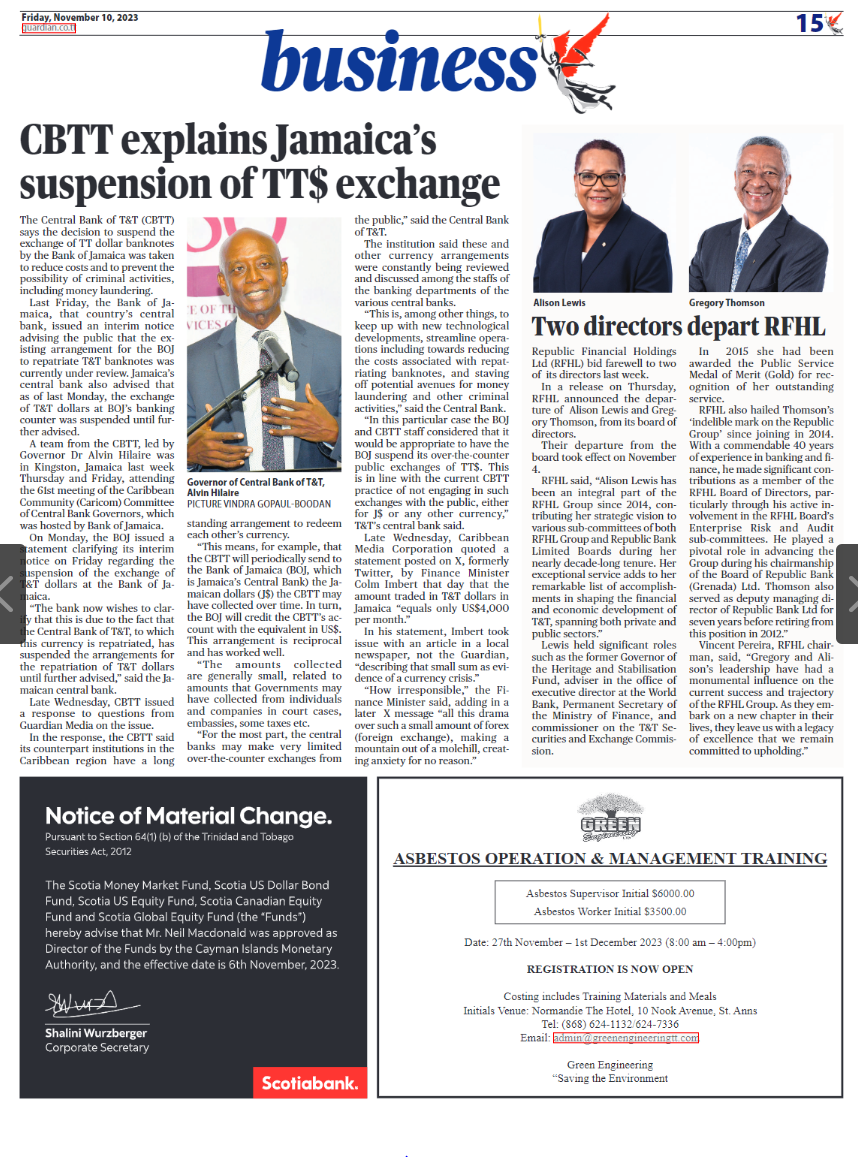CBTT explains Jamaica’s suspension of TT$ exchange
The Central Bank of T&T (CBTT) says the decision
to suspend the exchange of TT dollar banknotes
by the Bank of Jamaica was taken to reduce costs
and to prevent the possibility of criminal
activities, including money laundering.
Last Friday, the Bank of Jamaica, that country’s
central bank, issued an interim notice advising
the public that the existing arrangement for the
BOJ to repatriate T&T banknotes was currently
under review. Jamaica’s central bank also advised
that as of last Monday, the exchange of T&T
dollars at BOJ’s banking counter was suspended
until further advised.
A team from the CBTT, led by Governor Dr Alvin
Hilaire was in Kingston, Jamaica last week
Thursday and Friday, attending the 61st meeting
of the Caribbean Community (Caricom)
Committee of Central Bank Governors, which
was hosted by Bank of Jamaica.
On Monday, the BOJ issued a statement clarifying
its interim notice on Friday regarding the
suspension of the exchange of T&T dollars at the
Bank of Jamaica.
“The bank now wishes to clarify that this is due
to the fact that the Central Bank of T&T, to which
this currency is repatriated, has suspended the
arrangements for the repatriation of T&T dollars
until further advised,” said the Jamaican central
bank.
Late Wednesday, CBTT issued a response to
questions from Guardian Media on the issue.
In the response, the CBTT said its counterpart
institutions in the Caribbean region have a long
standing arrangement to redeem each other’s
currency.
“This means, for example, that the CBTT will
periodically send to the Bank of Jamaica (BOJ,
which is Jamaica’s Central Bank) the Jamaican
dollars ( J$) the CBTT may have collected over
time. In turn, the BOJ will credit the CBTT’s
account with the equivalent in US$.
This arrangement is reciprocal and has worked
well.
“The amounts collected are generally small,
related to amounts that Governments may have
collected from individuals and companies in
court cases, embassies, some taxes etc.
“For the most part, the central banks may make
very limited over-the-counter exchanges from
the public,” said the Central Bank of T&T.
The institution said these and other currency
arrangements were constantly being reviewed
and discussed among the staffs of the banking
departments of the various central banks.
“This is, among other things, to keep up with
new technological developments, streamline
operations including towards reducing the costs
associated with repatriating banknotes, and
staving off potential avenues for money
laundering and other criminal activities,” said
the Central Bank.
“In this particular case the BOJ and CBTT staff
considered that it would be appropriate to have
the BOJ suspend its over-the-counter public
exchanges of TT$. This is in line with the current
CBTT practice of not engaging in such exchanges
with the public, either for J$ or any other
currency,” T&T’s central bank said.
Late Wednesday, Caribbean Media Corporation
quoted a statement posted on X, formerly
Twitter, by Finance Minister Colm Imbert that
day that the amount traded in T&T dollars in
Jamaica “equals only US$4,000 per month.”
In his statement, Imbert took issue with an
article in a local newspaper, not the Guardian,
“describing that small sum as evidence of a
currency crisis.”
“How irresponsible,” the Finance Minister said,
adding in a later X message “all this drama over
such a small amount of forex (foreign exchange),
making a mountain out of a molehill, creating
anxiety for no reason.”
PICTURE VINDRA GOPAUL-BOODAN
Governor of Central Bank of T&T, Alvin Hilaire

